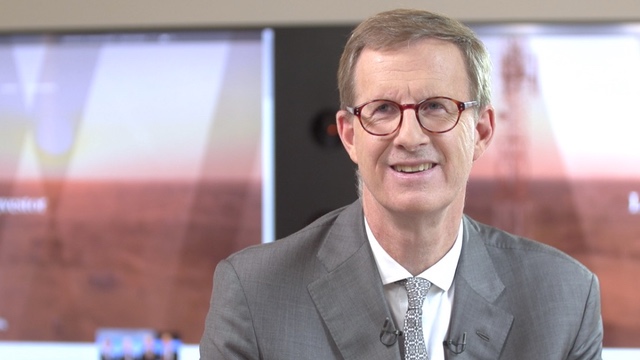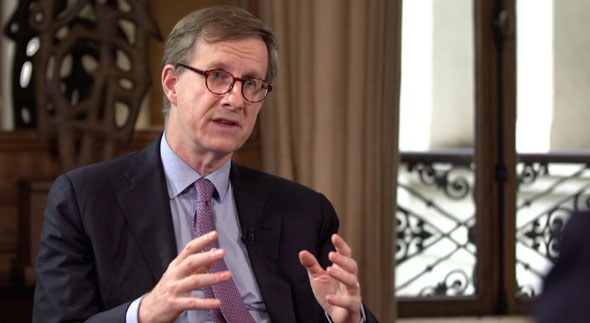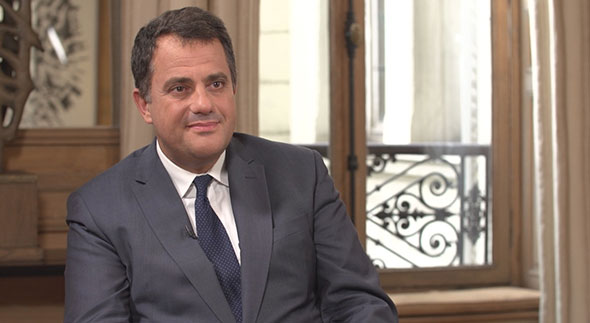EuroBusinessMedia (EBM): As every year Wendel holds its investor day, Jean-Bernard Lafonta, welcome.
Jean-Bernard Lafonta (JBL): Thank you,
EBM: You are the CEO of Wendel. In the context of this investor day there has been a lot of news flow out of Wendel these past couple of months, starting with the IPO of Bureau Veritas; you also sold your stake in Neuf Cegetel; and recently built up an important stake in Saint-Gobain. First off, what is your strategy today concerning investments in publicly traded companies, which now make up the majority of your portfolio?
JBL: I would first say that our main target in the companies in which we are, is to create value by improving the business and the growth, and the profitable growth they enjoy. Are they public or not doesn’t help or not for creating more value or less value. We are in controlling situations in Legrand, Bureau Veritas and we have a leading position in Saint-Gobain, where the capital is spread very largely, so that our position gives us the means to have a real dialogue on building and creating value within Saint-Gobain. We are rather comfortable with the prospects of the companies in which we are invested – public or not public. We were not very comfortable in the past months about investing into private transactions where we felt the multiples of debt and the multiples of value were quite demanding, and this is why we said one year ago that we would look also at public companies - which we did with Saint-Gobain - not with a minor stake but with a real stake. I guess that when the LBO market will become attractive again, because leverage will come back and will be lower, we’ll be again in that market, and that will change back the equilibrium of Wendel as a whole.
EBM: Given the proportion of listed companies in your portfolio, and given the re-appearance of a holding discount in your share price, the market seems to think that you've wound the clock back to the days of CGIP in terms of strategy. How do you respond to those who view Wendel in this way?
JBL: Once again, we are in controlling situations in 85% of the companies in which we invest and we have a leading position in Saint-Gobain. That was absolutely not the case of CGIP, where 66% of assets were minority stakes, with a role of second importance. What is key to us is to be in the position to have a real impact on value creation through strategy - and this is why we are in that position everywhere in our portfolio.
EBM: What is your strategy concerning your stake in Saint-Gobain, of which you own only 18%, i.e. less than a controlling stake, which is unusual for Wendel? Why not continue to build up your position in Saint-Gobain?
JBL: I would first say that with 18% we have a very significant weight in Saint-Gobain’s capital, as this capital is spread very largely in the market. With that weight in the capital, we already are in the position of having a constructive dialogue with Saint-Gobain’s management. This dialogue is ongoing, we view that as being satisfactory: we exchange about business and strategy and potential improvement and this is the key for us. I would add that we are rather long-term as usual but in Saint-Gobain also, and that after two years you have double voting rights in Saint-Gobain, so that with 18% of the capital you really have very significant weight, not only today but also in two years from now.
EBM: As you point out, it's been some time now since you've made any new investment in private equity. What is your outlook concerning your private equity investments? Are the current market conditions in the credit markets preventing you from pursuing your strategy in private equity?
JBL: I think that the market since this summer is almost closed for significant-sized transactions in LBO markets. It should reopen during 2008 – when, I don’t know - but I guess that at that time, with lower leverage and lower valuations, the risk/return will be much more attractive than it was before the summer. And of course we will be in the market again and I think that this market will be more agreeable for us than it was in the previous times.
EBM: If, however, you don't make any new investments soon, can we expect you to return cash to shareholders through dividends or share buybacks?
JBL: I would say that we have a significant pipeline of opportunities, either in France but also in Germany or Europe, with attractive opportunities, so we will look at when the market will come back in terms of debt in 2008. Nevertheless, I would just like to remind you that in the past, in the last five years, we gave back to the shareholders some 1.5 billion euros through cash dividends and share buybacks and that’s very significant compared to the market value of Wendel five years ago, which was 1.5 billion euros. So we’ll do the same in the future of course.
EBM: You've recently reinforced the teams at Wendel, notably in Germany and in Asia. Where do your expansion projects stand today, across Europe and internationally?
JBL: In Europe we are focused on the Netherlands where we have – with Oranje Nassau -- one hundred years of history in that country and we have a lot of connections in this country. We decided also to invest and focus on Germany, because we believe that the profile we have -- long term, industrial, family -- helps a lot for having access to very attractive deals in Germany. We hired a German guy, Rolland Lienau, who has an extensive experience in investment, acquisition, structuring of financing -- he acquired that experience at Paribas and Deutsche Bank -- so we feel that for 2008 and 2009 we are in a position to go one step further towards Europe. We also decided to look at Asia, and more specifically -- for the same reasons of the profile of Wendel -- towards Japan and Korea, and we hired Philippe Donnet who has an extensive experience, from an operational point of view, in insurance business, but was in charge of Axa in Japan which he turned around successfully, and was in charge also of Asia Pacific there, so he has a very attractive know-how for us about Asia, as well as about operational business.
EBM: Some analysts believe that your portfolio is overexposed to the construction market, which appears risky in today's macro-economic environment. What is your response?
JBL: We conducted a thorough analysis of what are the end markets and exposure of the various companies in which we are invested -- from an EBITA point of view -- and we came to the conclusion that as a whole, the weight of new residential businesses inside gross asset value of Wendel is around 15%. This is spread over a very important number of geographies and we feel, furthermore, that most of these geographies have a limited risk in terms of decline, which is of course not the case of the US, but the US knows that situation since one year -- and that will continue -- and they represent a minor part of our exposure towards the various geographies inside our growth asset value. So, as a whole I would say 15% is not totally negligible, but the spread in terms of geographies, and in terms of exposure of these geographies, means for us that this risk is manageable.
EBM: How is Materis holding up under current market conditions?
JBL: Materis had a very brilliant year in 2007, with 7% of organic growth and 7% of external growth. They made that organic growth through innovation, weight, emerging markets and also synergies they took out of acquisitions in the painting business, which is more exposed to renovation. As a whole, we feel that Materis should be able to continue to over perform the market in 2008, and we are rather confident in their ability to have a modest, or more modest growth in 2008.
EBM: What is your situation update concerning the ongoing restructuring of Deutsch?
JBL: Deutsch had to implement a certain number of action plans in order to get more commercial synergies between their businesses in the US and business in Europe, and also prepare the basis for looking after savings, as in purchasing for example. That job was implemented in 2007 and we think we’ll reap the fruits of that in 2008. So we are rather optimistic about what we will be able to get in 2008.
EBM: What are your comments on the business performance of Stahl, which has been deemed under par by the market?
JBL: I think that we were ourselves concerned by Stahl since the end of 2006 and we said that to the market and we decided to change the CEO of Stahl in the beginning of 2007, and he did a great job. We feel that today it’s a little bit short to have a definitive view about the future, but we are on the right track in terms of growth and profitability, so we are rather confident for 2008.
EBM: Finally, what is the outlook for disposals and renewal of your portfolio in 2008?
JBL: This is a significant part of what we do every year. In 2007 we sold for 1.4 billion euros of assets and we bought for 1.5 billion, so in as difficult a year as 2007 we were able to move, and I think that in 2008, which should be also a difficult year, we’ll continue to do that. From a more specific point of view, I said that for example in our portfolio we were looking at partnerships regarding Stallergènes, to expand their reach, from a commercial point of view, on their pills product to the US. And we are going to see what the consequences of that are, also in terms of capital if needed. So we are quite open on the management of our portfolio and we’ll continue to do that in 2008.
EBM: Jean-Bernard Lafonta, CEO of Wendel, thank you very much.
JBL: Thank you





